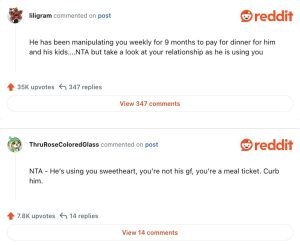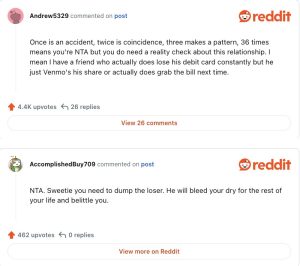A woman found herself in a recurring predicament after several months into her relationship: every time she and her boyfriend went out to eat, particularly when his children were with them, he would ‘forget’ his wallet, leaving her to cover the bill. Over time, this pattern left her feeling used and prompted her to finally address the issue.
This 32-year-old woman had been dating her 35-year-old boyfriend, a father of two young children, for nine months. Their relationship seemed to progress well, except for a troubling pattern that emerged whenever they dined out. It reached a point where their dining habits became a contentious issue, culminating in a significant argument that made her reassess their relationship dynamics.
Driven by a mix of frustration and a need for advice, the woman turned to the Reddit community to seek opinions on whether her response to the situation was appropriate. She detailed her experiences and asked for feedback, which sparked a variety of responses from the community, many of whom criticized her boyfriend’s behavior.
The woman was particularly concerned about the impact of her actions on her boyfriend’s children. She knew they enjoyed their weekly restaurant outings, which had become a cherished ritual. Yet, time and again, her boyfriend would conveniently ‘forget’ his credit card, claiming each time with a sheepish grin that he had left it at home.
Initially, the woman was sympathetic and didn’t mind covering the expenses, recognizing that occasional forgetfulness could happen to anyone. However, as these incidents became a predictable occurrence, she noticed the financial strain it was causing her, especially after footing the bill for several expensive meals in a row.
One evening, particularly aware that this pattern might continue, she decided to take preventive measures. She had just received her paycheck from a second part-time job and knew they were planning another dinner out with his children. Anticipating her boyfriend’s usual forgetfulness, she sent him a text earlier in the day, reminding him to bring his wallet. He responded with a laugh, dismissing her reminder as a joke.
That night at the restaurant, the children, unaware of the financial dynamics, ordered enthusiastically from the menu, choosing several of the pricier options. Before they started their meal, she casually asked her boyfriend if he had remembered his wallet. His reaction was one of feigned shock as he patted his pockets and searched his jacket, only to feign realization and claim, “Guess I forgot it in the other pair of jeans I thought I was going to wear.”
When he sheepishly asked her to pay “just this one more time,” she reached her breaking point. Feeling manipulated, she collected her belongings, stood up from the table, and announced that she was not going to pay for the meal. Her boyfriend was stunned, hastily asking where she was going and what she was doing.
She firmly told him that she was tired of being financially taken advantage of and was not prepared to continue subsidizing him and his children under these pretenses. With that, she walked out of the restaurant, leaving her boyfriend to deal with the situation he had created.
Later, he called her, accusing her of selfishness for leaving him and his children in such an awkward situation at the restaurant. He stressed that he had to cancel the meal and take his children home hungry, as he couldn’t afford to pay for the dinner himself.
This incident sparked a heated exchange between them about her perceived lack of empathy for his children and her feeling of being used. He argued that her actions were a reflection of how she might treat his children in the future, while she maintained that her reaction was a necessary stance against being continually exploited.
After sharing her story on Reddit, she revealed that her boyfriend remained upset about her actions at the dinner. The Reddit community largely supported her decision, with many users suggesting that her boyfriend was exploiting her financial generosity. They encouraged her to consider whether this pattern was something she was willing to tolerate or if it was a deal-breaker for their relationship.
Reflecting on the advice she received, the woman considered her next steps carefully, weighing her own financial well-being against the relationship’s emotional demands. What would you have done in her position? Was her decision to walk out justified, or should she have handled the situation differently?






